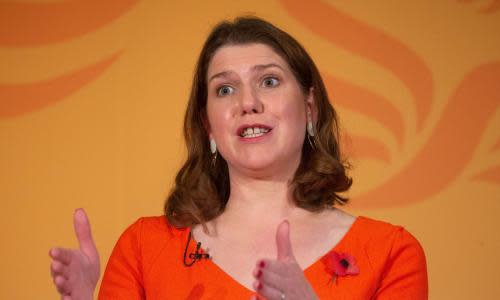I can be next PM, says Jo Swinson at launch of election campaign

Jo Swinson has formally launched the Liberal Democrats’ election campaign with a remain-dominated message, insisting she can become prime minister but declining to specify what the party might do if it holds the balance of power.
Swinson told an event in Westminster that Brexit and other political shifts had made December’s election hugely unpredictable, and that she believed her party, which took just under 8% of the votes in 2017, and is polling at about 15% now, could win a majority.
“Don’t let anyone tell you what has to happen. Change is possible, and you get to choose,” the Lib Dem leader said in her message to voters.
“I never thought I’d stand here and say that I’m a candidate to be prime minister. But when I look at Boris Johnson and Jeremy Corbyn, I am absolutely certain I could do a better job than either of them.”
In reality, senior Lib Dems say privately that even doubling the party’s current tally of 20 MPs in the election would count as a significant success, meaning a more realistic outcome would be to hold the balance of power in a hung parliament.
Related: Lib Dems accused of using misleading data on election material
In her speech and answering subsequent questions, Swinson reiterated her stance that the Lib Dems would not actively support either Johnson or Corbyn as prime minister. Asked if she could back a Labour government, she was scathing about its leader.
“On so many grounds, Jeremy Corbyn is not fit for the job of prime minister,” she said. “On the biggest issue of the day, he has prevaricated and will not give a straight answer. Even now if you ask him whether he is remain or leave he will not tell you how he would vote.
“His plans for the economy would take us back to the 1970s. I believe he would be a threat to our national security.”
But asked to outline any details of what the party would do – for example supporting Labour if Corbyn was no longer in charge – Swinson declined to do so, saying only: “As Liberal Democrat leader, what I am offering to the public is a Liberal Democrat government.”
The Lib Dems are part of a remain-based voting alliance with Plaid Cymru and the Greens, under which parties will stand down in each others’ favour in some seats, with details on the plan due later this week.
Asked why the alliance could not be extended to remain-minded Labour MPs in ultra-marginal seats such as Rosie Duffield in Canterbury, Swinson said she admired many things about Duffield but added: “She’s still the Labour party. And people in the Labour party are standing on a manifesto that’s going to be about delivering Brexit. It’s about putting Jeremy Corbyn into No 10. That’s not something that we can support.”
She also condemned Johnson, noting what she said were similarities to the US president: “With his big lies, his brash promises and his attitude to women, it’s pretty clear who Boris Johnson is modelling himself on – Donald Trump.”
In her speech, Swinson highlighted the new Lib Dem campaign pledge of a “remain bonus”, which the party argues would be £50bn made available for public services over five years by protecting the economy through stopping Brexit.
The party’s policy, agreed at its autumn conference, is that it would revoke Brexit without a referendum in the admittedly unlikely event it won a majority in the Commons, or else would push for a second referendum.
Asked how a Lib Dem government could unite the nation, Swinson argued that there was not a Brexit plan that commanded majority support across the county.
“As Liberal Democrats we are standing up for what we believe in, and being very honest and straightforward about that,” she said. “I recognise there are differences of opinion on this issue, and I think people recognise and appreciate that we are consistent and we are firm in what we are standing for.”
While Brexit dominated her speech, Swinson said EU membership was emblematic of the Lib Dems’ wider approach, arguing: “It is about who we are as a country. It’s about the choices that we make – whether or not we think it’s a good idea or not to work with other countries, with our closest neighbours, to meet our shared challenges. It is about recognising that our humanity does not stop at our borders.”
The election, she argued, would shape “the future of our country for generations to come”.
Swinson said: “This is not a normal election, it’s not a typical choice of whether you want the red team or the blue team to be in government for a few more years.”

 Yahoo News
Yahoo News 